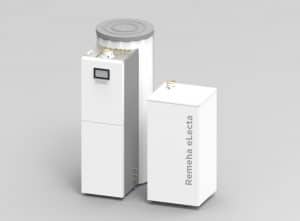After the gas industry, the heating industry is now also increasingly relying on hydrogen. Although the absolute sales figures for fuel cell heaters are still low, a clear growth trend can be observed. In 2019, the number of funding applications rose by 30 percent compared with the same period of the previous year.
This at least gives the members of the Fuel Cell Initiative (IBZ) hope that a real market could emerge in the coming years. However, a turnaround in the heating sector cannot be spoken of here for a long time yet.
Once a year, representatives of the IBZ meet to bring each other up-to-date on the latest developments in fuel cell technology. And every year it is stated once again that the absolute sales figures are still low, that public awareness campaigns can be optimised, that the bureaucratic effort required to obtain funding is immensely high and that installers need to be more closely involved.
This was also the case on 29 October 2019, when around 70 industry representatives gathered in Frankfurt am Main and stated that “fuel cell heaters could make it possible for everyone to enter the hydrogen age”. In order for this to actually happen, however, there are still some prerequisites that need to be changed, and this is precisely what is happening at the moment. At IBZ, no one really knows what the best way might be to achieve sales figures in Germany similar to those in Japan.
For more than twenty years now, stationary fuel cell systems have been researched and developed in Germany. And at least thanks to good funding conditions, there is now a market in Germany that is growing – albeit slowly. On average, the installation of a fuel cell unit in Germany is funded with around € 11,000, but the price to be paid by the customer himself is still five times higher than for the purchase of a conventional condensing boiler.
According to Stefan Thiel, Sales Manager for Germany at Buderus Thermotechnik, the luxury segment is where FC heaters definitely pay off. For example, a fuel cell system without a peak load boiler, but connected to a water-operated wood-burning stove in an upscale single-family home, pays for itself comparatively quickly, especially if an electric car is available for recharging. Thiel openly admitted, however, that this was not a mass market.
…
read more in H2-international February 2020

























0 Comments